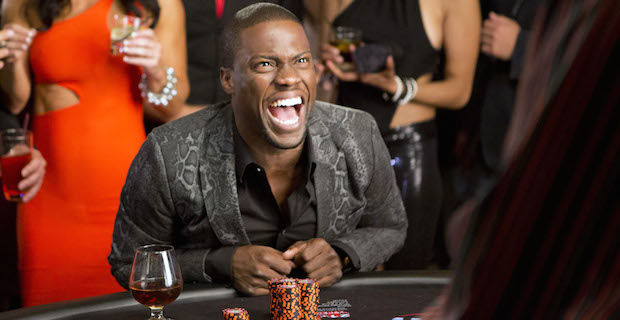
Written by Keith Merryman and David A. Newman
Directed by Tim Story
USA, 2014
The opening lines of Kevin Hart’s voiceover wax philosophical on the history of Las Vegas, but they’re less an introduction to Think Like a Man Too so much as a restatement of what is obvious to anyone in the audience: this is Kevin Hart’s movie. The massively popular comedian’s ubiquity is no secret (see: Hart discussing his pro wrestling reawakening with Jon Stewart) and his presence in Tim Story’s 2012 half-adaptation of Steve Harvey’s sex advice book Act Like a Lady, Think Like a Man all but guaranteed his return for any sequel.
But, beyond the serious box office legs of the original, why a sequel? Think Like a Man begins with Hart’s same overly-enthusiastic narration, though the original sports a quick-witted dissection of monogamy and sex’s driving impetus on male heteronormativity, all of which is slapped on top of Studio Mir’s gorgeously animated “history of man” time lapse. Think Like a Man Too is keen to replicate the tone of this introduction, but the evolution of Nevada’s industrial tourist trap over a PowerPoint of archival photos doesn’t even touch the lofty, if undercooked, aim of the original. (That goes double for the sequel’s Vegas setting, a choice that falls somewhere in between ‘shenanigans fuel’ and “Well, those Hangover movies made a lot of dough.”)
It’s hard not to feel cynical about this second outing, even when the film bothers to check in with its couples. Jeremy (Jerry Ferrara) and Kristen (Gabrielle Union) disagree on when and even how to have their first child, Lauren (Taraji P. Henson) and Dominic (Michael Ealy) find themselves on separate career paths, and Zeke’s (Romany Malco) womanizing past is finally catching up to him — much to the chagrin of girlfriend Maya (Meagan Good). Intimate stresses on these relationships are meant to put further pressure on the nuptials of Candace (Regina Hall) and Michael (Terrence Jenkins), whose own wedding plans fall prey to Michael’s righteous, Old Testament mother (Jenifer Lewis) — but after perfunctory dialogue from each partner audibly (and obviously) confirms as much, any interest is lost in meaningful drama, as if writers David A. Newman and Keith Merryman were caught in the same slot machine hypnosis as Bennett (Gary Owen), the film’s doofy white boy.

As Cedric, serial divorcee and the bachelor party’s self-appointed ‘Wolf Pack’ leader, Kevin Hart spends his time away from providing voice-over by sprinting from one emasculating sequence to the next. Letterboxd reviews are littered with awkward praise for Hart’s work, often broadly characterizing his Napoleon complex antics as the “best” thing going here. But Hart isn’t the best thing about Think Like a Man Too. He’s the only thing.
The bachelor/ette fodder blackjack tables and dance clubs function like candy stores for Hart’s wide-eyed kid, but when taken outside the antics of the party’s lone single man, everything else in the film wilts. Scenes aren’t so much ‘scenes’ as digressions and overstretched montages, and any attention paid to Zeke’s ghosts of girlfriends past or Kristen’s need to let loose get shuffled into the deck. There’s only one sequence that’s attracted any word of mouth, and while it’s far from “hysterical,” Story hits the pause button for a stylized night on the town. His fish-eye lenses and precise staging to the 90s hit “Poison” are a fun indulgence — so much so that the insertion of Bel Biv DeVoe feels, as is the case with the overbearing narration, like an afterthought.
The difference is that the self-satisfied R&B works. Were Think Like a Man Too a debauched string of stylish sequences of pool cams and indoor skydiving, it might have resembled the auteur’s answer to Adam Sandler and Dennis Dugan’s million-dollar movie vacations. Instead, it feels like Ride Along, Story’s other 2014 release, in its supporting of Hart’s undeniable charisma by way of terrible material. Hart doesn’t dominate the picture in the same way Robin Williams did in mid-90s comedy mode, but his personality and intermittent voice-over saturate the Vegas weekend with an omniscience that doesn’t gel with a character who wants nothing to do with long-term relationships. In Hart’s hype-man shrill, the weekend becomes a sloppy metaphor for basketball, both redefining the traditional three-act structure into four “quarters” as well as redefining the value of narration. From the get-go, Hart’s Cedric is a cynic with a heart of gold, but his voice-over work feels like the result of a studio executive’s strongly-worded phone call.
In the days before comic book movies were regarded as serious texts, Tim Story’s two Fantastic Four pictures resembled strange outliers to the then-quintessential examples in Raimi’s Spider-Man films. Chief among the problems in Story’s duology was his failure to meld danger with network sitcom-level frivolity. Story’s fluffy sensibilities have found a home in romantic comedy’s low-stakes predicaments, but Think Like a Man Too‘s problem is that it doesn’t have any.
— David Klein

